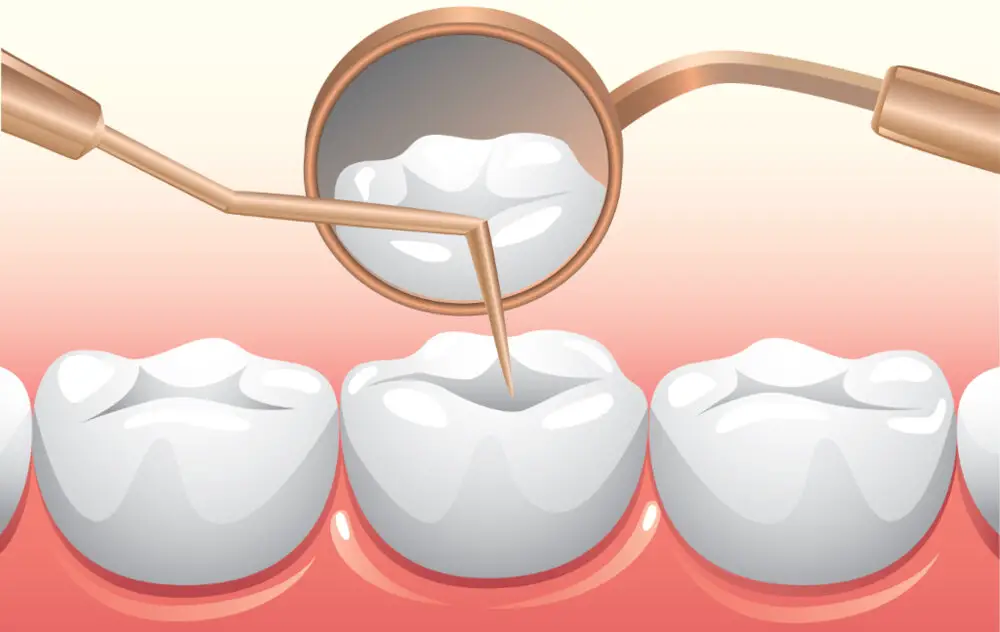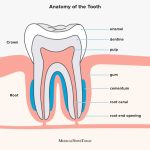Why Do My Teeth Hurt? The Science Behind Tooth Sensitivity to Cold Water

Tooth sensitivity is a common dental problem that causes discomfort or pain when consuming hot or cold foods and drinks. It can also be triggered by sweet or acidic foods, brushing, or flossing, and can occur in any tooth or multiple teeth at once. Tooth sensitivity is often a sign of an underlying dental issue, and understanding the science behind it can help prevent further damage and improve overall oral health. The outer layer of the tooth, the enamel, is the body’s hardest tissue, but it can be worn down by various factors such as acidic or sugary foods, aggressive brushing, or grinding teeth. This exposes the underlying layer of the tooth, called dentin, which contains microscopic tubules that lead to the tooth’s nerve endings. When dentin is exposed to hot or cold water or other stimuli, the nerve endings become irritated, resulting in tooth sensitivity. Other possible causes of tooth sensitivity include gum recession, cracked teeth, or dental procedures such as teeth whitening.
Tooth sensitivity is a common dental problem that is characterized by a sharp and sudden pain when the tooth is exposed to hot or cold temperatures, sweet or sour foods, and even cold air. The root cause of tooth sensitivity is the exposure of the dentin layer of the tooth, which contains tiny tubules that lead to the tooth’s nerve endings. When the dentin is exposed, the stimuli can easily penetrate the tubules, stimulating the nerve endings and causing pain. Common causes of tooth sensitivity include tooth decay, gum disease, tooth grinding, and acidic foods and drinks. Proper dental hygiene, fluoride treatment, and desensitizing toothpaste can help alleviate tooth sensitivity, but it’s important to consult a dentist to determine the underlying cause and receive proper treatment.
The Anatomy of Teeth

The anatomy of teeth is complex and fascinating. Teeth are made up of several layers, each with a specific function. The outer layer of the tooth is called the enamel. Enamel is the hardest substance in the human body and is responsible for protecting the tooth from damage. Below the enamel is the dentin, a softer layer that makes up most of the tooth. The dentin contains tiny tubes called dentinal tubules that connect to the nerve endings in the pulp of the tooth. Finally, at the center of the tooth is the pulp, which contains nerves, blood vessels, and connective tissue. The pulp is responsible for nourishing the tooth and providing it with the ability to sense hot and cold temperatures. Tooth sensitivity to cold water can occur when the enamel on the tooth is worn away, exposing the underlying dentin. This can happen as a result of a variety of factors, including brushing too hard, consuming acidic foods and drinks, and grinding the teeth. When the dentin is exposed, the tubules in the dentin allow hot or cold temperatures to reach the nerve endings in the pulp, causing pain or discomfort. To address tooth sensitivity, it’s important to identify the underlying cause and take steps to protect the enamel and reduce the exposure of the dentin. This may include using a desensitizing toothpaste, avoiding acidic foods and drinks, and wearing a mouthguard to prevent teeth grinding.
Teeth are complex structures that are composed of several layers. The outermost layer of the tooth is called enamel, which is the hardest tissue in the human body. It protects the tooth from wear and tear and from the effects of temperature changes. Beneath the enamel is the dentin, which is softer and more porous than enamel. Dentin is responsible for transmitting sensations to the nerves in the center of the tooth, and when it is exposed to temperature changes, it can cause tooth sensitivity. The innermost layer of the tooth is the pulp, which contains blood vessels and nerves that keep the tooth alive. When the pulp becomes damaged, it can cause severe pain and may require root canal treatment. Understanding the structure of teeth can help us to better care for them and prevent tooth sensitivity and other dental problems.
Teeth are complex structures that serve a crucial role in the digestive system. They are made up of different layers, including the enamel, dentin, and pulp. The enamel is the outermost layer that protects the teeth from external damage and decay. It is the hardest substance in the human body and is responsible for giving teeth their white color. The dentin is the layer underneath the enamel that contains tiny tubes that connect to the nerves in the pulp. It is responsible for transmitting sensations such as hot or cold temperatures to the nerves. The pulp is the innermost layer that contains blood vessels, nerves, and connective tissues. It is responsible for providing nutrients and oxygen to the teeth and is crucial for their overall health. Understanding the different layers of teeth and their functions can help individuals better care for their teeth and prevent tooth sensitivity and decay.
Causes of Tooth Sensitivity

Tooth sensitivity is a common dental problem that can cause discomfort and pain. The causes of tooth sensitivity are numerous and can range from simple dental issues to more complex medical conditions. One of the primary causes of tooth sensitivity is tooth decay. When bacteria are allowed to grow in the mouth, they can attack the enamel and dentin of the teeth, causing them to become sensitive and painful. This can be exacerbated by poor dental hygiene, which allows bacteria to thrive in the mouth. Additionally, acidic foods and drinks can erode the enamel of the teeth, making them more sensitive to cold water and other stimuli. Another common cause of tooth sensitivity is gum recession. As the gums recede, the roots of the teeth are exposed, which can cause sensitivity to cold water and other stimuli. This can be caused by a variety of factors, including gum disease, brushing too hard, and aging. In some cases, gum recession may be a sign of a more serious dental issue, such as periodontitis or tooth decay. Other potential causes of tooth sensitivity include cracked or chipped teeth, teeth grinding, and certain dental procedures such as teeth whitening or orthodontic treatment. Regardless of the cause, tooth sensitivity can be a frustrating and painful problem that requires prompt attention from a dental professional.
Tooth sensitivity can be caused by several factors, including tooth decay, gum recession, tooth grinding, and enamel erosion. Tooth decay occurs when bacteria in the mouth produce acid that eats away at the tooth’s protective layer, exposing the sensitive nerve endings inside. Gum recession, which can be caused by brushing too hard or gum disease, can also lead to sensitivity as the root of the tooth becomes exposed. Tooth grinding puts pressure on the teeth, causing the enamel to wear away, while acidic foods and drinks can erode the enamel as well. Identifying the cause of tooth sensitivity is important to prevent further damage to the teeth and gums.
Gum recession, also known as gingival recession, is a common dental problem where the gums start to recede, exposing the tooth’s root. This can cause tooth sensitivity, as the root is not protected by enamel and is more sensitive to temperature changes, especially to cold water. Gum recession can be caused by a variety of factors, including improper brushing technique, gum disease, aging, and even genetics. If left untreated, gum recession can lead to tooth decay, tooth loss, and other dental problems. Treatment options for gum recession include scaling and root planing, gum grafting, and good oral hygiene practices.
Enamel erosion is the gradual wearing away of the outer layer of the teeth, caused by exposure to acids found in food and drinks. The enamel serves as a protective shield for the sensitive dentin and nerves within the tooth, and once it’s gone, it cannot be replaced. Common culprits of enamel erosion include sugary and acidic foods such as citrus fruits, soda, and sports drinks. Additionally, brushing too hard or using a toothbrush with hard bristles can also contribute to enamel erosion. Over time, enamel erosion can lead to tooth sensitivity, as the dentin and nerves become more exposed to hot or cold temperatures. It’s important to take measures to protect your enamel, such as limiting acidic and sugary foods, using a soft-bristled toothbrush, and practicing good oral hygiene habits.
Tooth decay is a common dental problem that affects people of all ages. It is caused by the buildup of plaque, a sticky film of bacteria that forms on the teeth. Plaque produces acid that erodes the tooth enamel, leading to cavities and tooth sensitivity. Poor oral hygiene, sugary and acidic foods, and drinks, as well as certain medications and medical conditions, can increase the risk of tooth decay. If left untreated, tooth decay can cause severe pain, infection, and tooth loss. To prevent tooth decay, it is essential to practice good oral hygiene, limit sugary and acidic foods and drinks, and visit a dentist regularly for checkups and cleanings.
Cracked teeth can be a common cause of tooth sensitivity. The enamel on our teeth is a hard, protective layer that can become weakened over time due to factors such as grinding, clenching, or biting hard objects. When the enamel is weakened, the teeth become more susceptible to cracks and fractures. These cracks can allow cold water to seep into the tooth, causing pain and sensitivity. In severe cases, a cracked tooth may require a root canal or even tooth extraction. It’s important to take good care of your teeth to prevent cracks and other dental problems from occurring. This includes regular brushing and flossing, using a mouthguard if necessary, and avoiding habits that can damage the teeth.
Grinding or clenching teeth, known as bruxism, is a common dental habit that can lead to tooth sensitivity. This condition can occur during the day or at night, often triggered by stress or anxiety. The constant pressure on the teeth can cause the enamel to wear down, exposing the dentin layer, which contains microscopic tubules that communicate with the tooth nerve endings. This can lead to discomfort or pain when consuming hot or cold foods and drinks. Wearing a mouthguard at night or practicing stress-reducing techniques during the day can help alleviate the symptoms of bruxism and prevent tooth sensitivity.
The Science of Tooth Sensitivity

Tooth sensitivity to cold water can be a painful and frustrating experience. While it may be tempting to ignore the issue, understanding the science behind tooth sensitivity can help you take steps to alleviate the discomfort. Tooth sensitivity occurs when the protective enamel layer of teeth wears down or is damaged, exposing the underlying dentin layer. Dentin contains microscopic tubules that lead to the nerves of the tooth, allowing sensations such as temperature and pressure to be felt. When exposed to cold water, these tubules can transmit the sensation to the nerve, causing pain. There are several factors that can contribute to tooth sensitivity, including brushing too hard, gum recession, and tooth decay. In some cases, certain foods or drinks, such as acidic beverages, can also exacerbate sensitivity. To address tooth sensitivity, it is important to identify the underlying cause and take steps to protect and strengthen the enamel layer. This may include using a soft-bristled toothbrush, avoiding acidic foods and drinks, and using desensitizing toothpaste or fluoride treatments. By taking a proactive approach to tooth sensitivity, you can help reduce pain and improve the overall health of your teeth.
Tooth sensitivity is a common dental concern that can cause discomfort and pain when consuming hot or cold substances. The sensitivity occurs due to the exposure of the dentin, a layer of the tooth that lies beneath the enamel. When the enamel is worn down, either through erosion or abrasion, the dentin is exposed, and the tubules that lead to the nerve endings become more vulnerable. This exposure can cause pain or discomfort when consuming cold water, air, or sweet or acidic foods. Additionally, gum recession or periodontal disease can also cause tooth sensitivity, as the root surface of the tooth becomes exposed. It is important to address tooth sensitivity with a dental professional to determine the underlying cause and develop a treatment plan.
The nerve endings in teeth are responsible for transmitting sensory information from the tooth to the brain. These nerves are found in the pulp, the innermost part of the tooth, and are sensitive to various stimuli, such as temperature, pressure, and chemical changes. When exposed to cold water, for example, the nerve endings in the teeth can become irritated and send signals to the brain, causing a sharp, painful sensation. This response is due to the contraction of the fluid within the dentinal tubules, which are tiny channels that run through the tooth’s hard outer layer, the enamel, to the softer inner layer, the dentin. As the fluid moves, it triggers the nerves in the pulp, leading to the sensation of tooth sensitivity.
Treatment Options for Tooth Sensitivity

Tooth sensitivity can be a frustrating and uncomfortable experience, but fortunately, there are several treatment options available to help alleviate the symptoms. One of the most common treatments is the use of desensitizing toothpaste, which contains compounds that block the nerve pathways responsible for transmitting pain signals. These toothpastes can take several weeks to have an effect, but they are often quite effective at reducing sensitivity over time. In addition, there are a variety of mouthwashes, gels, and other products available that can help reduce sensitivity and provide relief. For more severe cases of tooth sensitivity, there are several other treatment options available. For example, dental sealants can be applied to the surface of the teeth to help protect the sensitive areas from exposure to temperature changes and other irritants. Similarly, a dentist may recommend a fluoride treatment, which can help strengthen the enamel of the teeth and reduce sensitivity. In some cases, more extensive dental procedures may be required, such as a root canal or dental crown. However, these options are typically only necessary for more advanced cases of tooth sensitivity, and most people are able to find relief through the use of simple, over-the-counter treatments.
Tooth sensitivity can be a painful and uncomfortable experience, but there are several treatment options available that can help alleviate the symptoms. One common approach is to switch to a toothpaste designed specifically for sensitive teeth, which contains ingredients like potassium nitrate or stannous fluoride that work to block nerve signals and reduce sensitivity. Another option is to use a fluoride rinse or gel to strengthen tooth enamel and protect against further damage. In more severe cases, a dentist may recommend a dental procedure such as a filling or root canal to address the underlying cause of the sensitivity. Overall, the best course of treatment will depend on the individual’s specific symptoms and the severity of their sensitivity.
Desensitizing toothpaste is a specialized toothpaste formulated to alleviate tooth sensitivity caused by various factors such as receding gums or enamel erosion. It contains ingredients such as potassium nitrate or strontium chloride that penetrate the tooth surface and block the nerve endings from transmitting pain signals. Additionally, some desensitizing toothpaste formulations also contain fluoride to promote remineralization of the enamel and prevent further erosion. Regular use of desensitizing toothpaste can provide relief from tooth sensitivity and improve overall oral health. However, it is important to consult a dentist if tooth sensitivity persists, as it may indicate an underlying dental issue that requires professional treatment.
Fluoride treatments are a common procedure used by dentists to help prevent tooth decay and strengthen the enamel. The treatment involves the application of fluoride to the teeth in the form of a gel, foam, or varnish. Fluoride works by remineralizing the enamel, which is the outer layer of the tooth. This process helps to repair any damage caused by acids produced by bacteria in the mouth. Fluoride treatments are especially beneficial for people who are at a higher risk of developing tooth decay, such as those who have a history of cavities or who consume a lot of sugary foods and drinks. Additionally, fluoride treatments can help to reduce tooth sensitivity by strengthening the enamel and protecting the nerves of the teeth.
Dental bonding is a cosmetic dental procedure that involves the application of a tooth-colored resin material to the surface of the teeth. It is commonly used to repair chipped or cracked teeth, close gaps between teeth, and improve the appearance of discolored or misaligned teeth. The bonding material is applied to the tooth surface, shaped to match the natural contours of the tooth, and then hardened using a special light. Dental bonding is a relatively quick and painless procedure that can be completed in a single office visit, making it a popular choice for patients seeking to improve the appearance of their teeth. However, it is important to note that dental bonding is not a permanent solution and may need to be replaced over time. Additionally, it is not recommended for patients with extensive tooth decay or damage, as more extensive restorative procedures may be necessary to properly address these issues.
Root canal therapy is a commonly performed dental procedure to treat tooth pain and inflammation caused by infected or damaged pulp inside the tooth. During the procedure, the dentist removes the damaged pulp, cleans and disinfects the root canal, and then fills it with a special material. This process not only relieves the patient’s pain but also saves the tooth from further damage or decay. Although root canal therapy has a reputation for being painful and unpleasant, modern techniques and anesthetics have made the procedure relatively painless and comfortable for patients. If left untreated, tooth sensitivity and pain can lead to more severe complications, such as abscesses and tooth loss. Therefore, it is essential to seek prompt dental treatment if you experience any tooth sensitivity or pain.
The article \Why Do My Teeth Hurt? The Science Behind Tooth Sensitivity to Cold Water\ explains the causes of tooth sensitivity to cold water. Tooth sensitivity occurs when the protective enamel layer on the teeth wears down, exposing the dentin layer. This layer contains tiny tubes that lead to the nerve endings, causing discomfort when exposed to cold or hot temperatures. Factors that contribute to enamel erosion include brushing too hard, acid consumption, and gum disease. To prevent tooth sensitivity, one should practice good oral hygiene, avoid acidic foods and drinks, and use a soft-bristled toothbrush. In severe cases, a dentist may recommend treatments such as fluoride varnish or bonding.
Tooth sensitivity can be a frustrating and painful experience, and it is crucial to seek professional dental care when experiencing it. Tooth sensitivity can be an indicator of more severe underlying oral health issues, such as tooth decay, gum disease, or a cracked tooth. A dentist can examine the teeth and gums and identify the root cause of the sensitivity, providing proper treatment and preventative measures to ensure the issue does not persist. Neglecting tooth sensitivity can lead to further complications, including tooth loss, infection, and severe discomfort. Seeking professional dental care for tooth sensitivity issues is essential for maintaining optimal oral health and preventing more significant health problems down the line.
Conclusion

In conclusion, tooth sensitivity to cold water can be caused by a variety of factors, including exposed dentin, tooth decay, and gum disease. The science behind this discomfort is rooted in the relationship between the tooth’s nerve endings and the temperature of the water. It is crucial to seek dental treatment if you experience persistent tooth sensitivity to cold water, as it may indicate a more significant underlying issue. Maintaining good oral hygiene practices, such as brushing with a soft-bristled toothbrush and avoiding acidic foods and drinks, can help prevent tooth sensitivity in the future. Overall, being aware of the causes and treatments for tooth sensitivity can help ensure a healthier and more comfortable smile.







